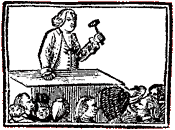“Trial, for the supposed Murther of Henry Sparker”
 On 3 June 1768, three Royal Navy officers went on trial in Newport, Rhode Island, for stabbing a local shoemaker named Henry Sparker.
On 3 June 1768, three Royal Navy officers went on trial in Newport, Rhode Island, for stabbing a local shoemaker named Henry Sparker.
That killing the previous month had reportedly caused an angry crowd to threaten to lynch the officers. Later chroniclers tied that tension to the political turmoil in America since the Stamp Act, but ordinary friction between the navy and civilian sailors, particularly over impressment, might have played a bigger role.
Oliver Arnold, the colony’s attorney general, prosecuted the case. Joseph Russell presided as chief justice, and the other judges that year were Metcalf Bowler, William Greene, Nathaniel Searle, and Samuel Nightingale. (Unlike in the Massachusetts system, Rhode Island superior court judges were elected for short terms instead of appointed for life by the Crown.) I don’t know who represented the defendants.
On 6 June 1768, the Newport Mercury reported on the trial:
Last Friday, at the Superior Court, held here, Mr. Robert Young, Mr. Thomas Carless, and Mr. Charles John Marshall…had their Trial, for the supposed Murther of Henry Sparker. The Jury, consisting of Gentlemen of Capacity and undoubted Reputation, having heard the Case plead, with the Evidences and Circumstances attending the unhappy Affair, went out, and in a few Minutes returned to their Seats, and declared the Prisoners not Guilty, the Verdict being to the entire Satisfaction of the Court; and accordingly the Prisoners were immediately and honourably discharged.—The Mercury printer, Solomon Southwick, clearly tried to present that outcome as just, emphasizing the jurors’ respectability and speed. A month before, a report had suggested that Philip Dexter “could not long survive”; this story insisted he was “now almost recovered.” It’s not clear whether Dexter testified that he didn’t think the officers were really guilty or whether his description of his own actions that night revealed that he had been the aggressor—as a report in the Boston Chronicle certainly suggested.
N.B. Mr. Dexter, the other Person wounded, is now almost recovered: His Evidence was greatly in Favour of the Prisoners.
Actual court records may say more about this case. The newspapers don’t even state which officer was accused of fatally wounding Sparker, but nineteenth-century historians said that was Midshipman Careless.
According to Capt. John Henry Duncan’s diary, published in The Naval Miscellany, in 1776 Midn. Thomas Careless was assigned to the Eagle. That ship carried Adm. Richard Howe to North America as he came to take over the war. Unlike most of his fellow midshipmen, Careless never rose to the rank of captain.
Careless’s captain back in 1768, Thomas Cookson, died in November 1775—not in the war but at age sixty-five in London. His son George, then fifteen years old, had already entered the Royal Navy, but Lord North sent him instead to the Royal Military Academy at Woolwich instead, and he became an officer in the Royal Artillery in 1778. He fought through the wars with Revolutionary and Napoleonic France and ended his military career as a general.

No comments:
Post a Comment